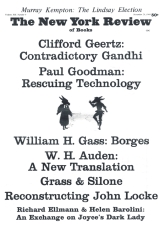In response to:
Southern Exposure from the September 11, 1969 issue
To the Editors:
A recent article in the New York Review [September 11] was brought to my attention. As the author, Mr. Eugene Genovese, was to have referred to my recent article in Science & Society (“Marxism without Marx: The Consensus-Conflict of Eugene Genovese,” S & S XXXIII (Spring 1969), 231-243) I felt that it might be worth taking a look. I was mistaken.
While I already had concluded that Mr. Genovese was a typical academic liberal I found that he was dishonest as well. That he saw fit to respond to the Science & Society article in another journal without citing the article or author is curious enough for a scholar. That his comments, presented as a “personal” aside, have almost nothing to do with the two books he is reviewing, is amusing.
I had to assure myself constantly (by frequent glances through the last ten years of Science & Society) that he was indeed referring to my article. As no other critique of Mr. Genovese has appeared in this journal, I was confident that this was the case. My difficulty lay in the fact that Mr. Genovese seems more concerned with gaining epithet points than with confronting the critique. In the space of only two columns Mr. Genovese refers to my article as “a lengthy series of falsehoods,” “scenario of ideological malice,” and “dose of inanity” appearing in Science & Society “which enjoys a well-deserved reputation for factionalism and an easy attitude toward the truth.” (Mr. Genovese is presumably not including the period when he was an editor of Science & Society). Mr. Genovese refers to his critics as “idiots” (presumably an objective historical observation). And so on. One of the more ironic aspects of all this is that Mr. Genovese has persistently called for a higher level of historical discussion in America.
Although Mr. Genovese appears to be unaware of the fact, it is no doubt true that there are readers of NYR who do not read Science & Society. Therefore, a few items of correction might be in order. First, Mr. Genovese’s statement that I accuse him of equating the slave south and the Union is strange. As with most everything in his comments, this has nothing to do with what was said in my article. Second, I make no mention of C. Vann Woodward, David Potter, or anyone else in whose company Mr. Genovese places himself. Surely Mr. Genovese is too modest. My article deals entirely with his work.
Third, Mr. Genovese is quite correct when he declares that attacks on him “as soft on Jefferson Davis” are quite unimportant. I made no such attack. However, as I mentioned in my article, it was Mr. Genovese’s reputation as a Marxist that concerned me. I merely attempted to show that despite Mr. Genovese’s proclamation of radicalism and sophisticated Marxism, he was neither a radical nor a Marxist. As one who is concerned with the level of Marxist historiography, I was concerned with the position of Mr. Genovese as the academic “house Marxist.” I felt that it might be fruitful for scholars and others to see that Mr. Genovese is not universally regarded by Marxists as the intellectual spokesman. Mr. Genovese seems to be letting the cat out of the bag when he asserts that his critics have been unwilling “to confront conservative criticism of their assumptions.” Perhaps Mr. Genovese has pioneered in the creation of a new political idiom “Marxist-conservatism.”
Finally, Mr. Genovese may be unaware of standard scholarly practice. The usual procedure when replying to an article or review is to correspond with the magazine that originally printed it.
If Mr. Genovese would be interested in responding to my article I would be more than happy to send him another copy of it so that he may read it.
Donald M. Bluestone
State University of New York
Oyster Bay
This Issue
November 20, 1969



